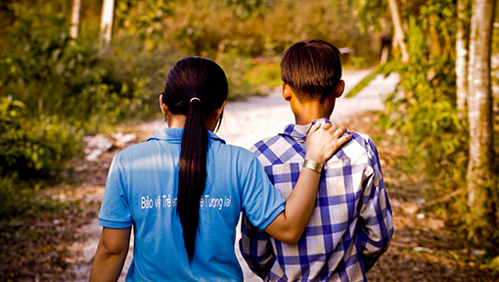
Landmark mental health report launched

A landmark report aiming to strengthen the mental health of children and adolescents in our region has been launched this week.
The report entitled ‘Strengthening Mental Health and Psychosocial Support Systems and Services for Children and Adolescents in East Asia and the Pacific Region’ was developed by UNICEF, the World Health Organization (WHO), UNESCO, the Global Social Service Workforce Alliance and Burnet Institute.
Child and adolescent mental health has received increasing attention globally and in our region, said Dr Elissa Kennedy, Burnet’s Co-Program Director of Maternal, Child and Adolescent Health and a member of the lead study team.
“But it has been – up until very recently – a really neglected public health need,” she said.

“We have very limited data, but the data that we do have indicates that children and adolescents in our region have a really substantial burden of poor mental health,” Dr Kennedy said.
“And experience really high prevalence of risk factors for poor mental health, such as exposure to violence, peer victimization, humanitarian disasters and conflict.”
Dr Kennedy said an added incentive to invest in child and adolescent mental health is because it’s the age when huge amounts of social-emotional learning and cognitive development occur.
“This is a really critical opportunity to support psychosocial wellbeing that sets children and adolescents up for good mental health into adulthood, and ensures that they can participate fully in education, social activities and family life.”
While there has been some really good progress in this region in better identifying that children and adolescents have mental health needs, Dr Kennedy said there’s a huge gap for services and supports that specifically address them.
“So this piece of work was really trying to define what are those critical actions that are needed to support mental health and wellbeing?” she said.
“And then to really understand how we can effectively implement those.”
The work underpinning the report was undertaken in two phases. Firstly, developing a regional conceptual framework for child and adolescent mental health and psychosocial support. And then trying to apply that framework in four countries – Malaysia, Papua New Guinea, the Philippines and Thailand.
“What we found was that despite the huge differences in the four countries’ contexts, their approach to the framework was very similar,” Dr Kennedy said.
All the learnings gained throughout the process were collated at the end to provide nine high level regional recommendations.
Dr Kennedy highlighted three of these:
- the need to reconceptualise the mental health system as being a system for mental health and psychosocial wellbeing reaching across multiple sectors not just health,
- expanding who we consider to be part of the mental health workforce to include people working in sectors like social welfare, child protection and education, and ensuring the skills they need are better defined and they’re giving appropriate training, and
- making sure that young people have a greater voice and participation in policies and programs around mental health and wellbeing.
“What has been really positive is that we’ve had really great engagement from government and non-government stakeholders in each of the four countries all through this process,” Dr Kennedy said.
“So hopefully, what we’ll see is strengthened policies and strategies around child and adolescent mental health, but hopefully also matching that with greater resource allocation and investment in truly multi-sectoral approaches to improve health and wellbeing.”
The in-country research was led by Burnet Institute, Papua New Guinea; the Institute for Population and Social Research, Mahidol University, Thailand; the Centre for Coordination of Clinical Research Network, National Institutes of Health, Malaysia; and the Research Institute for Mindanao Culture, Xavier University, Philippines, in partnership with UNICEF Country Offices.
CLICK HERE to read the report in full.



